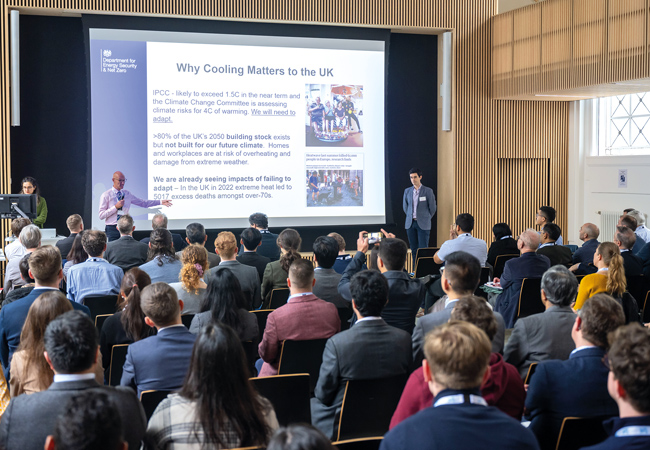
The keynote address at the Technical Symposium
Cooling was centre stage at the 2024 CIBSE Technical Symposium, as Professor Graeme Maidment gave insights into government work on air conditioning and refrigeration strategy at the event’s keynote address.
Maidment is professor of heating and cooling at London South Bank University, and works part-time at the Department for Energy Security and Net Zero (DESNZ) on cooling research associated with the government Mission Innovation project. He reminded the symposium that 2023 was the warmest year ever and that, in the UK, a record temperature of 40.3ºC was reached.
Extreme heat has a much greater impact on those who are disadvantaged, said Maidment; in 2022, it led to 5,017 excess UK deaths among the over-70s. He explained that cooling isn’t just essential for comfort, but has many critical applications in other sectors, such as hospitals, preserving food and medicines, industrial processes, and data centres.
He showed projections from UN Global Cooling Watch that indicate dramatic rises in cooling demand and energy consumption of cooling over the next 25 years. Without action to promote sustainable cooling and adaptation, air conditioning and refrigeration could contribute half a degree to global warming, Maidment said.
Moving south
The symposium was shown how much more energy has been used for cooling in the UK in recent years, with Maidment explaining how the number of cooling degree days for Gatwick has increased to an average of 46 per year over the past four years, compared with 29 for the past 20 years. This is similar to Rouen, in France, meaning the Gatwick climate is moving 50 degrees south each year.
Two of Maidment’s DESNZ colleagues, lead technical energy adviser Melanie Jans-Singh and senior energy adviser André Neto-Bradley, described how buildings in their hometowns of Pau, France, and Porto, Portugal, respectively cope with warmer temperatures. Jans-Singh said nearly all windows had shutters and are wider apart, to allow them to be opened, and Neto-Bradley emphasised how building layouts are designed to minimise solar gain.
Jans-Singh said the UK government has been building up evidence on which to base future cooling strategy, and she shared a study on three cooling scenarios for a 4°C temperature rise by 2100. With no policy interventions, energy demand would quadruple and consumption double. The two other scenarios were if the government pursued a passive-first policy or increased use of efficient technologies. Each of these scenarios was costed: no intervention would cost £60bn, passive first £30bn, and more efficient technologies £75bn.
A mix of passive and active solutions would be required, said Jans-Singh, who went on to describe the Global Cooling Prize. This partnership between the UK government and the Rocky Mountain Institute encourages the development of more efficient air conditioning and some recipients have developed systems that are 10 times more efficient than current ones.
Global Cooling Pledge
Maidment spoke about the CSNow project, looking at the energy consumption and emissions from cooling in the UK in 2021. It found that 15% of all electricity is used for cooling, very close to a figure for Germany that was calculated for 2017. The per capita amount of kWh going into cooling for both countries for those years was near identical at 789/790. The full report will be published soon, said Maidment.
Adaptation will be key to mitigating the risks of a warming climate, added Neto-Bradley, and the UK Climate Change Committee has highlighted as a priority the risks to health from overheating buildings. He said the cooling team is working to support evidence-based action to address these risks, and gave details of the Global Cooling Pledge signed by 60 countries at COP28 last December, when nations committed to – among other things – more energy efficient systems, a phasing out of high global warm potential refrigerants, promoting passive-first approaches, and collaborating on innovation and research.
Unified outlook
Maidment ended the keynote by describing how the UK government is meeting one of its pledges to produce a strategic overview of cooling. It will take a sector-by-sector approach to gathering evidence and he is keen for CIBSE Members to join the initiative.
‘This unified outlook will be a chance to identify gaps and opportunities for sustainable cooling,’ he said. ‘We need to be fit for 2050 and beyond – and, to do that, we need a clearer plan of what we’re doing in the UK on cooling.’
